The last time I interviewed James Cameron, the world’s most successful and frequently self-parodic director, we did not end on the best of notes. It was 2012 and Cameron had come over from his ranch in New Zealand to the Titanic museum in Belfast to promote the 3D Blu-ray release of Titanic. If you think that he would have been less than enthused about flying halfway around the world to talk about a movie he had made 14 years ago just because it was now in a format few truly give a fig about, you don’t know about James Cameron.
Even in a town full of megalomaniac monsters, stories about Cameron’s obsessiveness are part of Hollywood legend: he would get so enraged when crew members’ phones rang on the Avatar set he would nail-gun them to the wall (the phones, not the crew members, that is, although it probably could have gone either way). During the shooting of The Abyss, the crew took to wearing T-shirts that said: “You can’t scare me, I work for Jim Cameron.”
During our interview back then, in which he talked about the 3D-ification of a 12-year-old movie as if it were the most important development in cinema, he pretty well maintained his temper so it seemed safe to ask the question I’d always wondered about Titanic: “Why couldn’t Rose just share her giant board with Jack instead of leaving him to freeze in the ocean?” His face pinked with fury: “Wait a minute, I’m going to call up William Shakespeare and ask why Romeo and Juliet had to die!” You can’t scare me, I interviewed Jim Cameron.
This time we are meeting in a hotel down the road from his home in Malibu, and we are once again talking about an old movie of his that he has rendered three-dimensional: Terminator 2: Judgment Day. But while he looks like the Cameron I met before – all 6ft-plus of him, with a puff of white hair and bright blue eyes – there is something undeniably different. Instead of prowling around the room, now he is relaxing in a chair, his handshake friendly as opposed to bone-crushing. Has he, perhaps, changed in the past few years?

“Yeah, I think my demeanour at work is much more congenial,” he replies immediately. “I’ve learned that, OK, the film is important but quality of life is also important. But it’s a learned art for me. I think for Ron Howard it’s innate – he’s an innately nice guy. I’m an innately nice guy, but bringing that to work has been a learning curve.”
I wonder if marital stability has given him this new congeniality – he has now been married to Suzy Amis, who played the granddaughter in Titanic, for 17 years, his longest marriage by far. But such a connection is far too basic for Cameron. Instead, he puts it down to the uniquely Cameron-esque reason of going on multiple deep sea expeditions. Because making the most ambitious movies in the world barely touches the sides of Cameron’s energy levels, he spends his free time time exploring the ocean in mini-submarines; in 2012, he became the first person to make a solo journey to the Mariana Trench, the deepest part of the ocean floor, in a mini-sub he designed with a team of engineers.
“I’ve done eight deep-ocean expeditions and, at the end of the day there is no big movie, there is no red carpet. There’s just this little group of people who know how hard it is, and you’re all bonded around that. So I realised that it’s good to have a good movie at the end of a job, but it’s not the most important thing. The working environment is very important,” he says.
Cameron has also made frequent dives to the wreck of the Titanic (“More than anyone else,” he points out, with some un-zen emphasis) and, going in the other direction, is working with Nasa to film a forthcoming manned mission to Mars. Does everything always have to be on such a big scale with him? Could he perhaps not make a small indie romcom, or go fishing in a rowing boat?
“I look for things that haven’t been done. I like finding that gap between everything that hasn’t been done and what I think can be done. Everything I’ve ever done has been based on that little gap: every expedition, every piece of robotics that we built, every camera system, the deep-ocean stuff – it all falls into that same pattern,” he says.
Which brings us to Terminator 2, my favourite Cameron movie. Partly this is because it was the first of his films I saw in a cinema – Cameron is the ultimate film-maker who needs to be experienced on the big screen – and feeling my mouth drop open as I saw the T-1000 (Robert Patrick) morph from liquid metal into human, using technology invented by Cameron, remains one of my most memorable movie experiences.
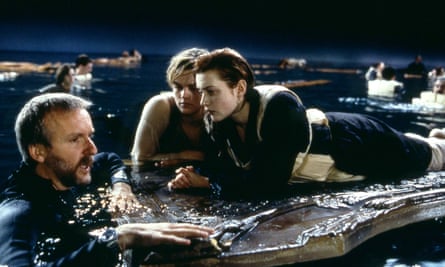
“That’s so cool!” he grins. “We’ll never be able to reproduce the shock of the new that the film created in its day, but we can now give you a very sumptuous experience,” he adds. This need to create an “experience” is why Cameron has been spending such an inordinate amount of time rendering his back catalogue 3D. Heavens forfend that a James Cameron movie should fail to make jaws drop, even three decades after its release. But as much as he focuses on the special effects, what really gives his films an enduring appeal is that he is a proper storyteller, which is why his movies are so fun in a way say, Michael Bay’s are not.
The first Terminator movie was never expected to be such a hit and, as such, has a grittily pessimistic, Dirty Harry-esque charm to it. When it came to writing Terminator 2, Cameron knew he was aiming for mass appeal and so he took Schwarzenegger’s character, a terrifying killing machine in the first Terminator movie, and turned him into a kind of comedy exchange student, an alien in a foreign world that both bewilders and charms him.
“Arnold HATED it – he even tried to talk me out of it! But I said: ‘No, this is what we’re doing, it’s really cool.’ And along the way, he saw the wisdom of it,” he says, with some pride that not even Conan could cow him.
As has since become par for the course with Cameron’s films, Terminator 2 was the most expensive movie ever made, costing more than $200m, and went on to become one of the highest ever earners, making more than $500m. But it could have all gone so wrong, had one of the producers had their way. “Mike Medevoy at Orion called me up one night and said: ‘I just went to this party and I got the movie cast!’ Now, of course, every film-maker loves to hear that some douche executive has cast your movie for you,” he says. “And he said: ‘OK, OJ Simpson for the Terminator.’ I was like: ‘Hey Mike! Bad idea! You’re going to have this black athlete chasing this white girl around LA with a fricking knife and a gun? We’re not doing that.’ Which was fortunate, but also unfortunate in that life ended up imitating art there.”
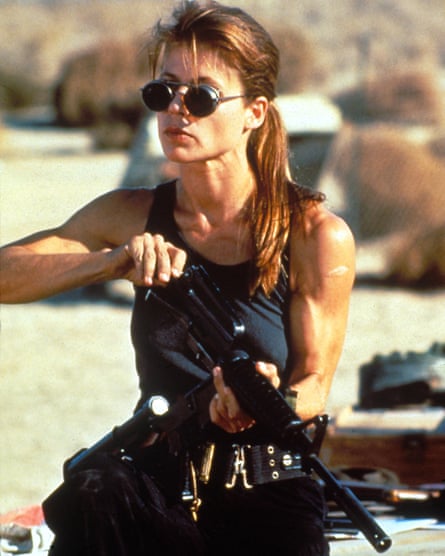
But as wise as Cameron was to go with Schwarzenegger over Simpson for the Terminator, it’s really Hamilton as Sarah Connor who makes Terminator 2 stand out, today especially. Pumped up and utterly uninterested in pleasing anyone, let alone any male gaze, if the character was a rarity back in 1991, she looks shockingly unique now. The only precedent for her, really, was Ripley in Alien, who, five years earlier, Cameron had moved from the sidelines to the centre when he took over from Ridley Scott to direct the sequel, Aliens.
For all his machismo, Cameron almost invariably puts genuinely tough female characters at the heart of his movies, from Dr Lindsey Brigman (Mary Elizabeth Mastrantonio) in The Abyss to Rose (Kate Winslet) in Titanic. So what did he make of the excitement over Wonder Woman?
“All of the self-congratulatory back-patting Hollywood’s been doing over Wonder Woman has been so misguided. She’s an objectified icon, and it’s just male Hollywood doing the same old thing! I’m not saying I didn’t like the movie but, to me, it’s a step backwards. Sarah Connor was not a beauty icon. She was strong, she was troubled, she was a terrible mother, and she earned the respect of the audience through pure grit. And to me, [the benefit of characters like Sarah] is so obvious. I mean, half the audience is female!”
So then why are movies still so bad when it comes to depicting truly powerful women?
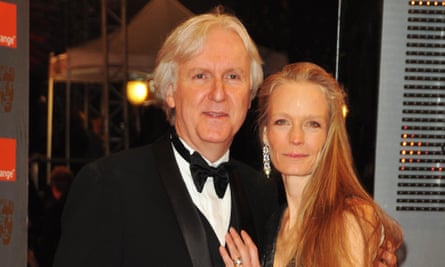
For the first time, Cameron is lost for words. “I don’t – I don’t know. There are many women in power in Hollywood and they do get to guide and shape what films get made. I think – no, I can’t account for it. Because how many times do I have to demonstrate the same thing over again? I feel like I’m shouting in a wind tunnel!”
Cameron doesn’t only enjoy writing strong women – he has quite a habit of marrying them. He has been married five times now, and his previous wives include director Kathryn Bigelow and two women closely involved in the Terminator movies: first, producer Gale Ann Hurd and then Hamilton.
“Being attracted to strong independent women has the downside that they’re strong independent women – they inherently don’t need you!” he says with a laugh. “Fortunately, I’m married now to a strong independent woman who does believe she needs me.” (Hamilton has a rather different take on why their relationship ended: “The very first night [I moved in with him], I realised I made a mistake,” she said in 2009. “He was the controlling director. The person I’d seen on set came back to life – we’re in his environment, and I didn’t have much of a say-so.”)
Did he and Hamilton start dating during the filming of T2?
“Oh no, obviously not. We got involved right after, but, you know, [dating an actor during filming] is a rule I will never break – well, I’m happily married now and it’s going to be for the rest of my life. But that’s a rule you can’t break as a director. As a matter of fact, Suzy and I, we were very attracted to each other when we first met [on Titanic], but we – we …” he breaks off, lost for words again. “I think about 10 seconds after we were done filming, well, you know ...”
Cameron has a daughter with Hamilton and three children with Amis, and the family split their time between New Zealand and Malibu, which sounds idyllic but I can’t imagine being around Cameron is exactly a relaxing experience. “I’m not good at relaxing, that’s true,” he says. “My idea of a vacation is to take the whole family to Tahiti and spend the week doing underwater photography with underwater vehicles.”
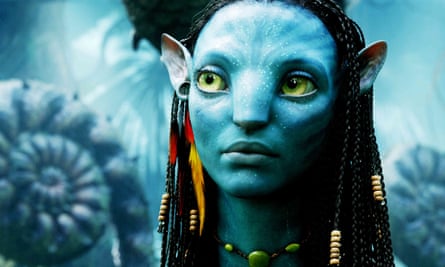
Nonetheless, Cameron looks so at ease you would never guess that he is tied up for the next eight years making another four – four! – Avatar movies, as well as feeling pretty doomy about the world’s future. A vegan and committed environmentalist, he is, unsurprisingly, not a Trump fan.
“There’s nothing that he’s done since he took office that should surprise anyone, but it’s about as horrific as it can be. At a critical point in history when we should have been making progress, we’re going in the wrong direction. The toll in human misery in the future was going to be big anyway, and it’s now going to be greater,” he says.
And on that cheerful note, our time is up. But I’m still not entirely convinced Cameron has really changed and there’s really only one way to test him.
“So,” I say. “I always wondered, why couldn’t Rose share her board with Jack at the end of Titanic?”
There is an ominous pause.
“Yeah, yeah, I get that a lot,” he finally says. “I guess I needed to make a smaller board apparently.” He laughs.
Oh James Cameron – you’ve GROWN.
Terminator 2: Judgment Day is out in 3D in cinemas on 29 August
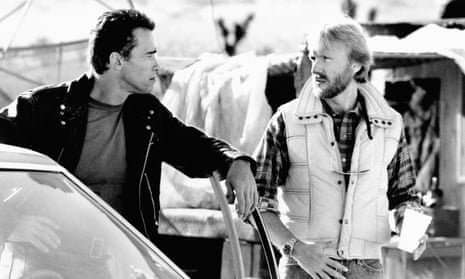
Comments (…)
Sign in or create your Guardian account to join the discussion